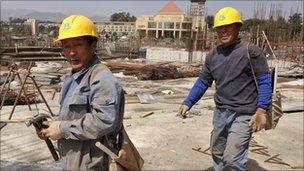China defends Africa economic and trade role
- Published

The growing Chinese presence on the African continent has attracted a mixed reaction
China has defended its economic and trade relations with African nations.
In the first policy paper on the subject, Beijing said China-Africa co-operation helped Africa to reach the UN Millennium Development Goals, and boosted common prosperity and progress.
China is now Africa's largest trading partner. Bilateral trade grew more than 43% to nearly $115bn (£74bn) in 2010.
But there has been strong criticism of China's resource grab in Africa and its "no strings" approach.
Chinese direct investment in Africa has jumped from less than $0.5bn in 2003 to more than $9bn in 2009.
China needs more natural resources such as oil, gas, and minerals for its rapidly growing economy, while Africa needs more investment in basic infrastructure to develop its potential.
China plans to expand the relationship to "a larger scale, broader scope and higher level", according to the policy paper released by the state information office.
Political reform
However, the growing Chinese presence on the African continent has attracted a mixed reaction.
While some Africans welcome the Chinese practice of separating politics from economics, others have expressed concern that Beijing's deepening involvement in the continent's development may worsen the level of corruption and the human rights and environmental issues there.
The key question for many African countries is whether they should adopt the Chinese model of growing the economy at the expense of political reform, rather than developing their own model.
Interestingly, the policy paper lists as good practice the China-Africa Co-operation Forum, which has been eagerly copied by the European Union and India.
Meanwhile US diplomats have shown some unease at China's growing influence in Africa.
- Published9 December 2010
- Published5 October 2010